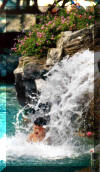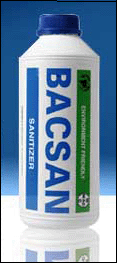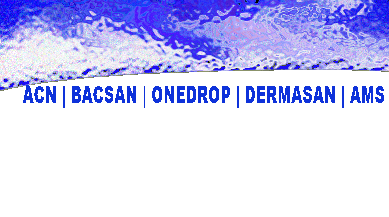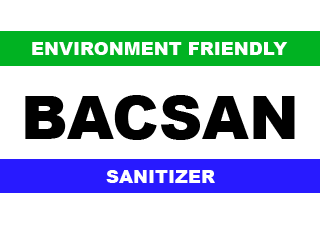| |

|
Instructions
for use, and initial dosage guidelines.
Product Functions:
- Algicide.
- Removes and disinfects the
biofilm which forms in pipes, canals and water systems without causing
corrosion.
- Prevention of infection of
water systems by water born bacteria such as legionella, yersinia,
shigella, salmonella, cholera and coliform bacteria.
- Disinfection of water systems
contaminated by water born bacteria such as legionella, yersinia,
shigella, salmonella, cholera and coliform bacteria.
Dosage Guidelines:
Depending on the quality of the
water being treated, the ratio at which Bacsan Solution is dosed into
the water can vary from 1:1000 to 1:500000. The active ingredients of
Bacsan Solution form a precipitate as they react with bacteria, algae
and dissolved solids etc, and therefore become used up. Dosing should
be carried out in such manner as to achieve optimum residual levels of
active ingredients once the initial precipitation reaction has taken
place. The maximum copper and silver ion concentrations of 1.00mg/l
and/or 0.05mg/l respectively should not be exceeded. The dosage of this
ionic solution needs to be properly assessed, designed and maintained
as part of an overall water treatment programme. The Water Supply
(Water Quality) Regulations and Private Supply Regulations prescribe a
maximum value for the level of copper, zinc, silver and nitrate ions in
drinking water supplies. It is important that users of this solution
are aware of the need to avoid any breach of these regulations and
maintain copper, zinc, silver and nitrate ions below the maximum
allowable concentration. It should also be noted that high
concentrations of dissolved solids will precipitate the ions out of the
solution, and that this ionisation process is pH sensitive and it is
difficult to maintain the ion concentrations above pH 7.6. The
concentration of dissolved solids and pH therefore needs to be
carefully controlled so that suitable ion levels are consistently
maintained. Oxidants may be added to the water to enhance the effects
of the ions in the water. Initial dosage ratios for different raw water
qualities are recommended as follows;
- Treated water which is potable
but where there is a build up of biofilm in the pipes, canals and
reservoirs or where there is a risk if bacterial or algal infestation;
1 litre of Bacsan per 150000 litres of water to be dosed directly into
the flow via dosing pump.
- Use in conjunction with
existing treatment methods such as chlorination or Ozone treatment will
result in significant reductions of total costs due to the synergy
between the different methods, as well as considerable reductions in
chlorine residual content in the treated water; 1 litre of Bacsan per
200000 litres of water to be dosed directly into the flow via dosing
pump.
- Untreated water with a total
dissolved solids (TDS) content of less than 500 mg/l and a total
bacterial count of less than 40000 per 100ml; 1 litre of Bacsan per
100000 litres of water to be dosed directly into the flow prior to
entering clarifiers or settling tanks, via dosing pump.
- Untreated water with a total
dissolved solids (TDS) content greater than 500 mg/l or a total
bacterial count greater than 40000 per 100ml; 1 litre of Bacsan per
75000 litres of water to be dosed directly into the flow prior to
entering clarifiers or settling tanks, via dosing pump.
- Once the above dosages have
been applied the treated water needs to be reassessed to establish if
the desired result has been achieved and the dosage is then to be
altered accordingly. Both the treated and the raw water must be
assessed on an ongoing basis as the raw water quality may fluctuate and
therefore necessitate the dosage ratio to be altered accordingly.
|
register
|
help
| webmail

|
|




